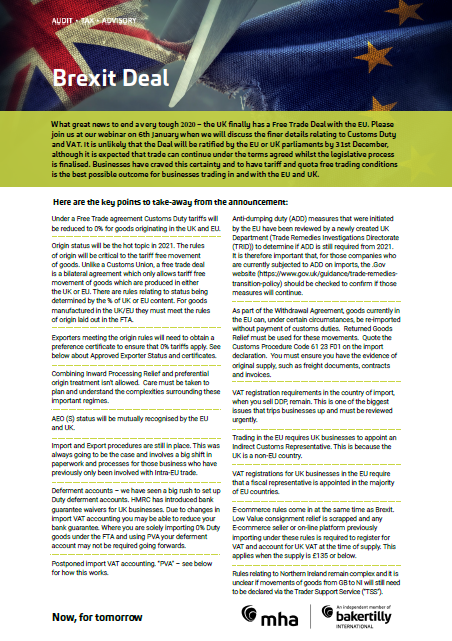Brexit Deal - Key Facts

Here are the key points to take-away from the Brexit Deal announcement:
- Under a Free Trade agreement Customs Duty tariffs will be reduced to 0% for goods originating in the UK and EU.
- Origin status will be the hot topic in 2021. The rules of origin will be critical to the tariff free movement of goods. Unlike a Customs Union, a free trade deal is a bilateral agreement which only allows tariff free movement of goods which are produced in either the UK or EU. There are rules relating to status being determined by the % of UK or EU content. For goods manufactured in the UK/EU they must meet the rules of origin laid out in the FTA.
- Exporters meeting the origin rules will need to obtain a preference certificate to ensure that 0% tariffs apply. See below about Approved Exporter Status and certificates.
- Combining Inward Processing Relief and preferential origin treatment isn’t allowed. Care must be taken to plan and understand the complexities surrounding these important regimes.
- AEO (S) status will be mutually recognised by the EU and UK.
- Import and Export procedures are still in place. This was always going to be the case and involves a big shift in paperwork and processes for those business who have previously only been involved with Intra-EU trade.
- Deferment accounts – we have seen a big rush to set up Duty deferment accounts. HMRC has introduced bank guarantee waivers for UK businesses. Due to changes in import VAT accounting you may be able to reduce your bank guarantee. Where you are solely importing 0% Duty goods under the FTA and using PVA your deferment account may not be required going forwards.
- Postponed import VAT accounting. “PVA” – see below for how this works.
- Anti-dumping duty (ADD) measures that were initiated by the EU have been reviewed by a newly created UK Department (Trade Remedies Investigations Directorate (TRID)) to determine if ADD is still required from 2021. It is therefore important that, for those companies who are currently subjected to ADD on imports, the .Gov website (https://www.gov.uk/guidance/trade-remediestransition- policy) should be checked to confirm if those measures will continue.
- As part of the Withdrawal Agreement, goods currently in the EU can, under certain circumstances, be re-imported without payment of customs duties. Returned Goods Relief must be used for these movements. Quote the Customs Procedure Code 61 23 F01 on the import declaration. You must ensure you have the evidence of original supply, such as freight documents, contracts and invoices.
- VAT registration requirements in the country of import, when you sell DDP, remain. This is one of the biggest issues that trips businesses up and must be reviewed urgently.
- Trading in the EU requires UK businesses to appoint an Indirect Customs Representative. This is because the UK is a non-EU country.
- VAT registrations for UK businesses in the EU require that a fiscal representative is appointed in the majority of EU countries.
- E-commerce rules come in at the same time as Brexit. Low Value consignment relief is scrapped and any E-commerce seller or on-line platform previously importing under these rules is required to register for VAT and account for UK VAT at the time of supply. This applies when the supply is £135 or below.
- Rules relating to Northern Ireland remain complex and it is unclear if movements of goods from GB to NI will still need to be declared via the Trader Support Service (“TSS”).
Download our publication to read more.
Download publication